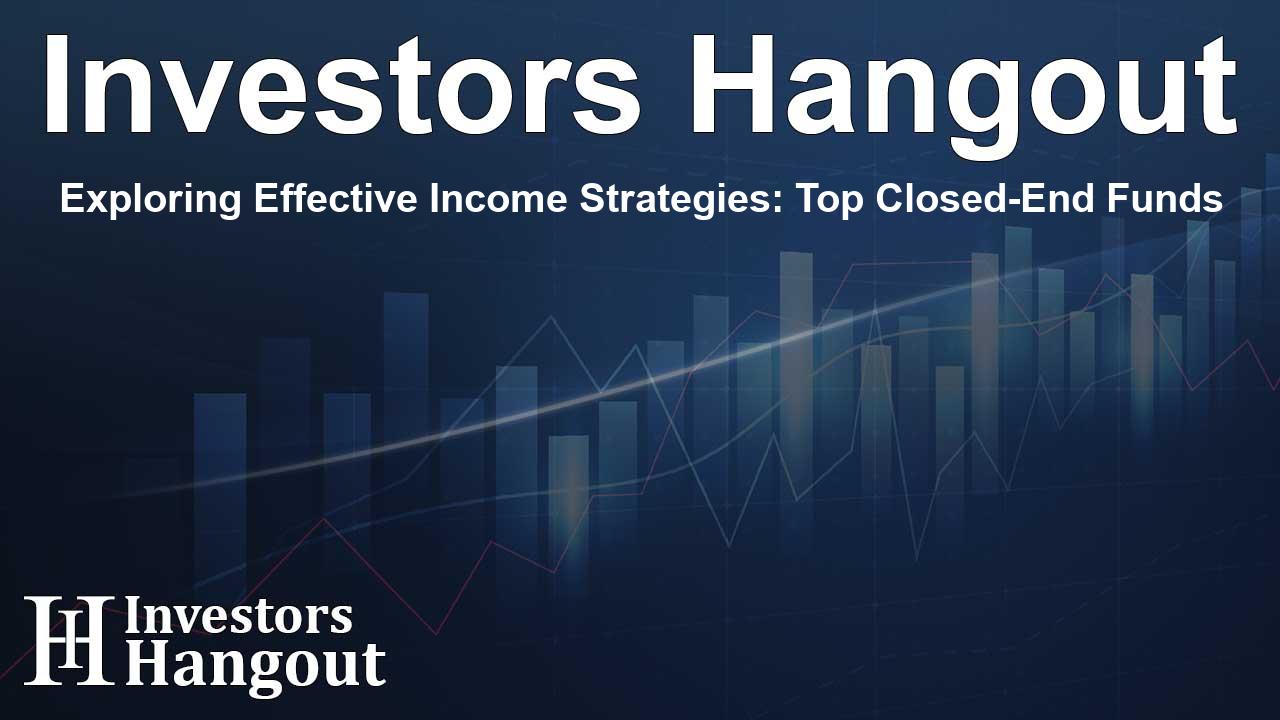Exploring Effective Income Strategies: Top Closed-End Funds

Maximizing Returns with Closed-End Funds in 2025
When it comes to diversifying your investment portfolio, closed-end funds (CEFs) provide a unique opportunity for both income and growth. This approach allows investors to balance their risks and benefits over time by strategically reallocating funds. With an average yield of around 8%, CEFs stand out as a lucrative option for those looking to enhance their income streams.
By investing in CEFs, you not only establish a substantial income footing, but you also gain flexibility. Unlike traditional index funds, where reinvestment options may be limited, CEFs let you move dividends across different funds. This ability to shift your investments provides a compelling advantage as market conditions fluctuate.
Analyzing Market Trends and Sector Performance
The past year has shown variable performance across various sectors. As we strategize for 2025, it's wise to contemplate reallocating investments from outperforming sectors into those lagging behind. Historically, underperforming sectors often catch up to their long-term averages.
For example, within the S&P 500, sectors such as communication services and finance have risen sharply, but healthcare has lagged, showing only modest gains recently. This disparity presents an attractive opportunity for focused investment.
Healthcare Sector: A Long-Term Perspective
Despite its recent struggles, the healthcare sector boasts a strong annualized return of about 9% over the last decade. This resilience makes healthcare funds, particularly those that provide dividends, an excellent candidate for investment reallocations.
The Abrdn Healthcare Investors (NYSE: HQH) stands out as a top performer in this category, delivering an impressive yield of 14.2%. This fund includes a mix of leading pharmaceutical companies, making it a solid choice for income-seeking investors.
Investors aiming for significant annual income would require a considerable investment in HQH—approximately $705,000 to achieve around $100,000 annually. What makes this fund even more appealing is its potential to partner with other healthcare CEFs, fostering diversification across the sector.
Evaluating HQH’s Performance and Discounts
Despite some volatility, HQH continues to perform well relative to the broader healthcare sector, achieving a 7.9% total NAV return this year, far exceeding its benchmark. Implementing a buy-and-hold strategy with HQH could pay off, particularly during periods of market recovery.
However, it’s essential to consider the implications of HQH’s recent dividend increases, as they may necessitate a reassessment of the fund’s long-term viability. If the fund's performance does not keep pace, there could be risks associated with its future distributions.
Comparing Alternatives: The Role of BME
In the realm of healthcare CEFs, the BlackRock Health Sciences Trust (NYSE: BME) serves as a valuable contrast to HQH. While it offers a lower yield at 7%, BME has demonstrated better long-term management and stability. Its share price behavior indicates a gradual decline, implying that it may be oversold relative to its intrinsic value.
BlackRock’s proactive discount management program protects BME investors, providing assurance that the fund is unlikely to face significant decreases in price. This strategy could yield positive returns even in less favorable markets.
Crafting a Balanced Mini-Portfolio
CEFs present exceptional opportunities for constructing a diversified mini-portfolio that spans multiple sectors. For 2025, consider incorporating funds yielding an average of 8.3%, which can foster stunning returns and consistent income.
Investors open to exploring a variety of CEFs will find countless options beyond healthcare. A strategically curated portfolio containing high-quality equities, corporate bonds, and real estate investment trusts (REITs) will enable you to pursue solid returns.
Ensuring exposure to each of these areas will not only secure your income future but also bolster your growth potential, setting a favorable stage for your finances in 2025. An investment strategy centered around CEFs remains a compelling approach, especially in today's dynamic economic landscape.
Frequently Asked Questions
What are closed-end funds (CEFs)?
Closed-end funds are investment funds that issue a fixed number of shares through an initial public offering. The shares then trade on stock exchanges, providing liquidity while allowing for investment in various securities.
How can I benefit from investing in CEFs?
Investing in CEFs can provide higher dividend yields than traditional equity funds, along with the potential for capital appreciation and portfolio diversification.
What sectors should I focus on for 2025?
Consider focusing on healthcare and other undervalued sectors that may see stronger performance in the coming year as market conditions improve.
Why is diversification important in investing?
Diversification helps reduce risk by spreading investments across various sectors and asset classes, mitigating the impact of poor performance in any single area.
What is the significance of dividend yields in investment strategy?
High dividend yields provide a steady income stream and can indicate the strength of a company’s cash flow, making them attractive for income-focused investors.
About Investors Hangout
Investors Hangout is a leading online stock forum for financial discussion and learning, offering a wide range of free tools and resources. It draws in traders of all levels, who exchange market knowledge, investigate trading tactics, and keep an eye on industry developments in real time. Featuring financial articles, stock message boards, quotes, charts, company profiles, and live news updates. Through cooperative learning and a wealth of informational resources, it helps users from novices creating their first portfolios to experts honing their techniques. Join Investors Hangout today: https://investorshangout.com/
Disclaimer: The content of this article is solely for general informational purposes only; it does not represent legal, financial, or investment advice. Investors Hangout does not offer financial advice; the author is not a licensed financial advisor. Consult a qualified advisor before making any financial or investment decisions based on this article. The author's interpretation of publicly available data shapes the opinions presented here; as a result, they should not be taken as advice to purchase, sell, or hold any securities mentioned or any other investments. The author does not guarantee the accuracy, completeness, or timeliness of any material, providing it "as is." Information and market conditions may change; past performance is not indicative of future outcomes. If any of the material offered here is inaccurate, please contact us for corrections.